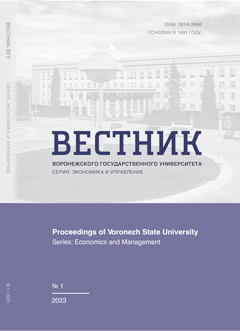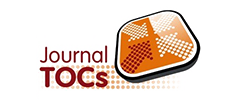Импортозамещение в современных условиях: методология анализа
Аннотация
Предмет. Условия, определяющие направления государственного внешнеэкономического регулирования, зависят от многих факторов как экономического, так и политического, социального, правового характера. В современных условиях они становятся доминантой, определяющей государственную экономическую политику, которая относительно международных связей получила название импортозамещение.
Цель. обоснование методологического подхода к анализу причин и последствий современного импортозамещения в России и влияния государства на его результаты.
Методология. Исходная методологическая предпосылка состоит в том, что импортозамещение, имеющее место в России с конца 90-х годов, по природе своей является реакцией экономической системы (в том числе и государственной внешнеэкономической политики) на внешние шоки, а не целенаправленной политикой государства, имеющей целью развивать малоэффективный сектор национальной экономики, конкурирующий с импортом в рамках национального рынка. В процессе анализа авторы опирались на метод эмпирического наблюдения на основе сбора и анализа аналитической, экспертной и статистической информации.
Результаты. Обоснована авторская позиция о том, что политика импортозамещения, проводимая в России с 90-х годов ХХ в., является политико-экономической реакцией на внешние шоки различного происхождения и характера, призванные разбалансировать микро- и макроэкономические связи страны. Выделена специфика трех этапов импортозамещения - 1998-2003, 2014-2021, 2022-настоящее время.
Обсуждение результатов. Полученные результаты сопоставлены с выводами исследователей, осуществлявших анализ импортозамещения в России в указанные временные периода на основе неоклассических предпосылок; делающих прогнозы относительно перспектив технологической составляющей импортозамещения.
Выводы. Проведенный анализ позволил сделать выводы о содержательной характеристике импортозамещения как результата влияния внешних шоков, под которыми понимается воздействие внешних факторов (экономических, политических, иных) на взаимосвязи, устойчиво сформировавшиеся в экономической системе, в результате чего происходит их разрушение; элементном составе импортозамещения, включающем содержательную сторону, определение роли государства, роли мирового рынка, направленности условий импортозамещения, технологическую составляющую; особенностях импортозамещения в России на различных этапах в период с 1998 по настоящее время.
Литература
Алешина, О. Г. (2022). Внешние и внутренние шоки в экономике: методология. Экономика и управление инновациями, 2, 39–60. [Alyoshina, O. G. (2022). External and internal shocks in the economy: a methodology. Economics and management of innovations, 2, 39-60. (In Russian).]
Анимица, Е. Г., Анимица, П. Е., Глумов, А. А. (2015). Импортозамещение в промышленном производстве региона: концептуально-теоретические и прикладные аспекты. Экономика региона, 3. [Animitsa, E. G., Animitsa, P. E., Glumov, A. A. (2015). Import substitution in industrial production of the region: conceptual-theoretical and applied aspects. Economy of regions, 3. (In Russian).]
Баранов, Э. Ф., Волкова, Н. Н., Лобзова, А. Ф. (2013). Импортозамещение в динамике внешней торговли товарами в Российской Федерации. Экономические Науки, 7(104), 8–11. [Baranov, E. F., Volkova, N. N., Lobzova, A. F. (2013). Import substitution in the dynamics of foreign trade in goods in the Russian Federation. Economic Sciences, 7(104), 8-11. (In Russian).]
Бодрунов, С. Д. (2015). Теория и практика импортозамещения: уроки и проблемы. СПб: ИНИР им. С.Ю. Витте. [Bodrunov, S. D. (2015). Theory and practice of import substitution: lessons and problems. SPb: INIR named after S.Y. Witte. (In Russian).]
Ватолкина, Н. Ш., Горбунова, Н. В. (2015). Импортозамещение: зарубежный опыт, инструменты и эффекты. Economy, 6(233). [Vatolkina, N. S., Gorbunova, N. V. (2015). Import substitution: foreign experience, tools and effects. Economy, 6(233). (In Russian).]
Ващелюк, Н. В., Полбин, А. В., Трунин, П. В. (2015). Оценка макроэкономических эффектов шока ДКП для российской экономики. Экономический Журнал ВШЭ, 19(2), 169–198. [Vashchelyuk, N. V., Polbin, A. V., Trunin, P. V. (2015). Estimation of macroeconomic effects of a DKP shock for the Russian economy. Economic journal of higher school of economics, 19(2), 169-198. (In Russian).]
Волкодавова, Е. В. (2009). Реализация стратегии импортозамещения продукции на российских промышленных предприятиях. Экономические науки, 12, 281–286. [Volkodavova, E. V. (2009). Realization of the strategy of import substitution of products at Russian industrial enterprises. Economic sciences, 12, 281-286. (In Russian).]
Волчкова, Н. А., Кузнецова, П. О. (2019). Сколько стоят контрсанкции: анализ благосостояния. Журнал НЭА, 3(43), 173–183. [Volchkova, N. A., Kuznetsova, P. O. (2019). How much do counter-sanctions cost: a welfare analysis. NEA journal, 3(43), 173-183. (In Russian).]
Гоголева, Т. Н., Косенков, А. Ю. (2023). Влияние кредитно-денежной политики государства на импортозамещение: российский опыт. Актуальные проблемы развития отраслевых рынков: национальный и региональный уровень: сборник статей VII Международной научно-практической конференции, 43–48. [Gogoleva, T. N., Kosenkov, A. Y. (2023). Influence of state monetary policy on import substitution: Russian experience. Actual problems of sectoral markets development: national and regional level : collection of articles of VII International scientific and practical conference, 43-48. (In Russian).]
Гимпельсон, Е.В. (2022). Человеческий капитал в эпоху санкций и контрсанкций: некоторые последствия его перераспределения. Журнал новой экономической ассоциации, 3(55), 234–238. [Gimpelson, E.V. (2022). Human capital in the era of sanctions and counter-sanctions: some implications of its redistribution. Journal of the new economic association, 3(55), 234-238. (In Russian).]
Зубарев, А. В., Рыбак, К. С. (2020). Влияние премии за риск на российские макроэкономические показатели. Экономический журнал ВШЭ, 24(3), 391–414. [Zubarev, A. V., Rybak, K. S. (2020). The impact of risk premium on Russian macroeconomic performance. Economic journal of the higher school of economics, 24(3), 391-414. (In Russian).]
Зубарев, А. В., Рыбак, К. С. (2022). Оценка влияния глобальных шоков на российскую экономику в рамках факторной модели. Журнал новой экономической ассоциации, 4(56), 48–68. [Zubarev, A. V., Rybak, K. S. (2022). Estimating the impact of global shocks on the Russian economy in a factor model framework. Journal of the new economic association, 4(56), 48-68. (In Russian).]
Зудин, Н. Н., Кузык, М. Г., Симачев, Ю. В. (2016). Зарубежный опыт проведения политики импортозамещения: на кого равняться? Россия: тенденции и перспективы развития, 11–3, 267–273. [Zudin, N. N., Kuzyk, M. G., Simachev, Y. V. (2016). Foreign experience of import substitution policy: on whom to be equal? Russia: trends and prospects of development, 11-3, 267-273. (In Russian).]
Кадочников, П. А. (2006). Анализ импортозамещения в России после кризиса 1998 года. ИЭПП. [Kadochnikov, P. A. (2006). Analysis of import substitution in Russia after the 1998 crisis. IET. (In Russian).]
Кнобель, А. Ю., Прока, К. А., Багдасарян, К. М. (2019). Международные экономические санкции: теория и практика их применения. Журнал НЭА, 3(43), 152–162. [Knobel, A. Y., Proka, K. A., Baghdasaryan, K. M. (2019). International economic sanctions: theory and practice of their application. NEA journal, 3(43), 152-162. (In Russian).]
Корхонен, И. (2019). Санкции и контрсанкции — каковы их экономические последствия для России и других стран? Журнал НЭА, 3(43), 184–190. [Korhonen, I. (2019). Sanctions and counter-sanctions - what are their economic consequences for Russia and other countries? NEA journal, 3(43), 184-190. (In Russian).]
Кошкин, А. П. (2016). Антироссийские санкции: история и современность. Информационно-аналитический вестник, 7. [Koshkin, A. P. (2016). Anti-Russian sanctions: history and modernity. Informatsionno-analyticheskiy vestnik, 7. (In Russian).]
Волчкова, Н. А. Турдыева, Н. А. (2016). Микроэкономика российского импортозамещения. Журнал НЭА, 4(32), 140–146. [Volchkova, N. A., Turdyeva, N. A. (2016). The microeconomics of Russian import substitution. NEA journal, 4(32), 140-146. (In Russian).]
Оруч, Т. А. (2023). Исследование показателей и результатов импортозамещения в промышленности России. Инновации и инвестиции, 1, 289–292. [Oruch, T.A. (2023). Study of indicators and results of import substitution in Russian. Innovations and Investments, 1, 289–292. (In Russian).]
Очкин, Р. О. (2018). Внешние шоки как детерминирующий фактор национально-государственных экономических интересов страны. Теоретическая экономика, 4, 144–149. [Ochkin, R. O. (2018). External shocks as a determinant factor of national-state economic interests of the country. Theoretical economics, 4, 144-149. (In Russian).]
Пилипенко, З. А. (2010). Шоки и разрыв причинно-следственных связей в экономических системах. Экономические науки, 12, 35–40. [Pilipenko, Z. A. (2010). Shocks and rupture of causal relations in economic systems. Economic sciences, 12, 35-40. (In Russian).]
Подоба, З. С., Молдован, А. А., Фаизова, А. А. (2019). Импортозамещение сельскохозяйственной продукции в России. ЭКО, 7(541), 123–139. [Podoba, Z. S., Moldovan, A. A., Faizova, A. A. (2019). Import substitution of agricultural products in Russia. ECON, 7(541), 123-139. (In Russian).]
Скрыпник, Д. В., Зайцев, А. А., Рязанов, К. А. (2019). Контрсанкции и российская экономика: эффекты для экономического роста, импорта и продовольственных рынков. MPRA, 96188. [Skrypnik, D. V., Zaitsev, A. A., Ryazanov, K. A. (2019). Counter-sanctions and the Russian economy: effects on economic growth, imports and food markets. MPRA, 96188. (In Russian).]
Фальцман, В. К. (2015). Форсирование импортозамещения в новой геополитической обстановке. Проблемы прогнозирования, 1, 22–32. [Faltzman, V. K. (2015). Forcing import substitution in the new geopolitical environment. Problems of forecasting, 1, 22-32. (In Russian).]
Goldberg, P. K., Khandelwal, A. K., Pavcnik, N., Topalova, P. (2010). Imported intermediate inputs and domestic product growth: Evidence from India. Quarterly journal of economics, 125(4), 1727–1767. https://doi.org/10.1162/qjec.2010.125.4.1727
Korhonen, I., Simola, H., Solanko, L. (2018). Sanctions, Counter-Sanctions and Russia – Effects on Economy, Trade and Finance. BOFIT Policy Brief, 4.
Milanovich, B. (2022). The novelty of technologically regressive import substitution. Global policy. https://www.globalpolicyjournal.com/blog/18/05/2022/novelty-technologically-regressive-import-substitution

Это произведение доступно по лицензии Creative Commons «Attribution» («Атрибуция») 4.0 Всемирная.























